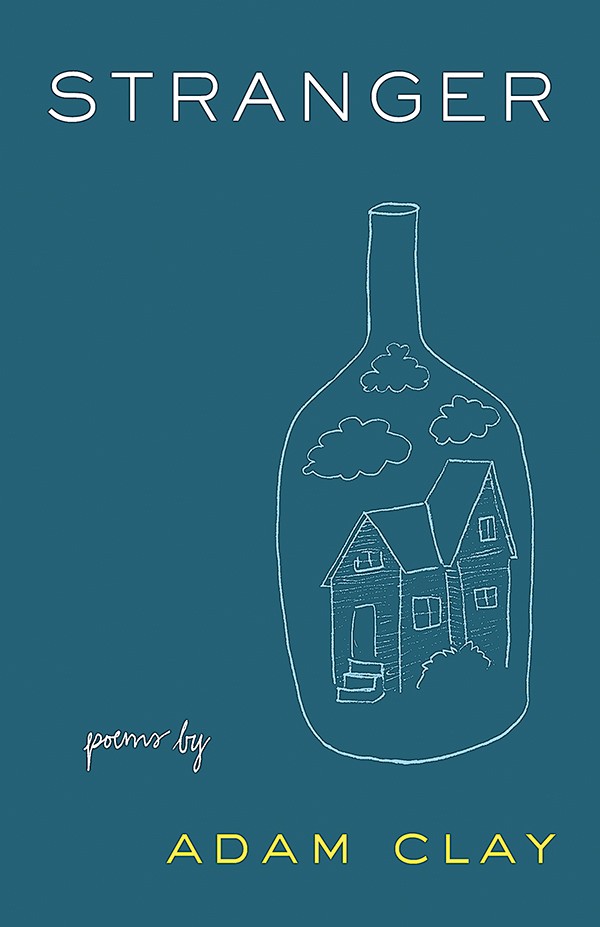Adam Clay’s Stranger is his third full-length collection after The Wash and A Hotel Lobby at the Edge of the World. In Stranger, Clay revisits the voice of Hotel Lobby, a speaker who experiences the everyday in overlapping juxtapositions of observation, memory, and thought. The speaker often wears the protective ache of solitude and questions himself and his shifting environment. In Stranger there is a settled-in feeling and a sense of growth — even mythmaking. Or mapmaking. Clay writes: “I’d like to make a map not of the land/but of the path I took to arrive in this place/a map with no idealized purpose,/a map of a thousand airless pines.”
The ambulatory poems here explore a world in blue, gray, and bronze, a palette of cloud, reminiscent of Larry Levis. The poetic line is often a wandering razor with the rightward lean of Charles Wright, but the measured voice is wholly Clay’s. That I would place a young poet such as Clay in the company of these two greats says something of the sureness of his voice, allowing him to steadily circle and interrogate the language of sky, home, and fishing line.

Clay has blurred the tension between the wooded and human worlds with a blend of surrealism and wonder. The purpose of the bird and river imagery is rarely to make a comparison but to push through ecological awareness into language — though the awareness is present also. What I love about Clay’s swift navigational shifts in space (in one poem from Hotel Lobby: snow, Memphis weeds, a sky folded in on itself, sleep, memory, a hand held in Boston) is the way the words intend intensely. Clay’s poems have a dream quality, and like any good dream that haunts your morning, most take more than one reading to suss out. They’re worth it though — you don’t walk away empty-headed.
Clay develops darkness more fully in Stranger. Fear and longing are soft spots in the consciousness of the speaker, though approached with the deep tenderness of familial love. There is the reality that this world is not the speaker’s choice of worlds, but this is the given world, a world of knowing and not knowing, and it is the one he, his wife, and daughter must live, grow, and create in. Growth, language, observation, and creation all intermingle in “Upper Peninsula.” Clay writes “Myths start somewhere” and:
Our daughter grows like that very question:
she invents music,
sounds, words—water finds a way—
and a bird
cannot be anything more
than itself anymore.
A few lines later:
… I did not know
that fourteen lines would
not be enough to contain
what we knew was true
but were too ashamed to ask.
The speaker is referring to the birth of the daughter here, and of meeting the boundaries of poetry as a container for expression. The question of form is asked repeatedly in the book, form as a boundary imposed on a poem, but also the form of a room, or a home lived in and left behind. Form is also a word and its limitations to describe or impart. Clay prods at the purpose of form and considers it strange. Form, however, is not just a container, but also a verb, a way of making, and making is important here. The act of creation is illustrated especially in the figure of the daughter who has “enough mysticism / for us all,” who, in the act of learning and inventing language, invents and holds the world in all its wonder and sadness, and is one reason for both hope and concern.
Did I say these poems were darker? Let me reconsider. They are concerned, interested, and question the extent to which words are capable. Fatherhood de-familiarizes comfort, and the borders of the world are dark. The poems refer to school shootings, environmental degradation, things difficult to make meaning from. However, Clay writes, “I’m calling out to you/as if we’re building a nest, one word at a time.” These poems are not about statements, but about dreaming, like Gillian Welch suggests, of the highway back.
Adam Clay is reading with Ada Limón and Michael Robins at the Impossible Language poetry reading April 8th, 7 p.m., at story booth in Crosstown Arts.
Ashley Roach-Freiman is a librarian and MFA candidate at the University of Memphis. She coordinates and hosts the Impossible Language reading series.